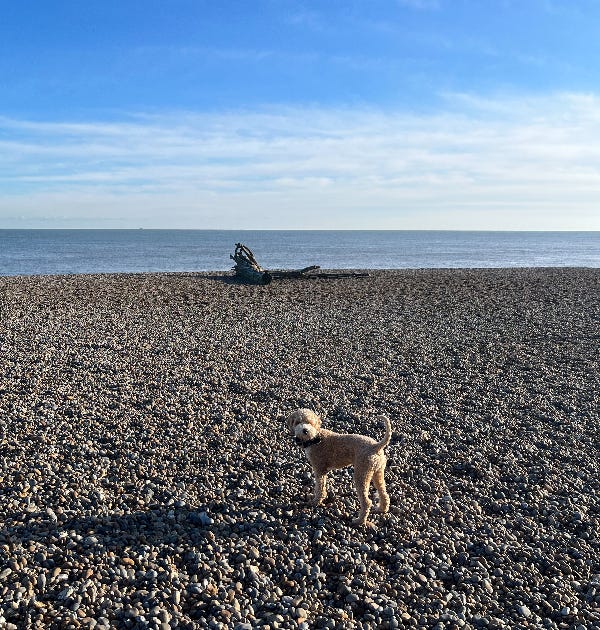Phantoms and chimera
This week: how we create our own monsters; how we create our own poodles; and a fresh take on the Tube Map.
I am at the seaside for a few days, courtesy of a lovely friend with a lovely house, in an attempt to get the book I’ve been writing for a year a few steps closer to the finish line. Here’s a photograph of Henry Scampi not being frightened of something for once:
(New things he is frightened of, this week: window cleaners; stairs.)
As tends to happen when I leave London, this has made Westminster and everything that happens there feel suddenly a very long way away. This is in some ways strange – most of my interactions with politics involve either the news or social media, both things equally available to me on the Suffolk coast as in the capital – yet it seems to hold true nonetheless. I wouldn’t say that it’s given me anything as useful as a fresh perspective, it’s merely made me feel like I don’t know what’s going on.
Which is, from some angles – such as the one where I have to write about it – a problem.
But needs must, so let’s try the old trick of taking two different things I’ve spotted in the wild and explaining how they’re actually one thing. Thing one is this tweet from Diane Abbott concerning “reform” of the NHS:


Abbott obviously means this as an attack on a Labour leader who’s several shades too right-wing for her taste, so this probably isn’t the take that you’re expecting, but: I think she’s being a bit too kind there. I’m not convinced Starmer’s talk of “reform” has even that much content. His shadow health secretary Wes Streeting has some radical ideas, yes; but I’ve seen little evidence Starmer himself has thought much about them.
The way the Labour leader uses the word “reform” isn’t about health policy at all. It’s about signalling to a certain type of voter that the NHS will not simply be handed money (even though there is ample evidence at this point that this is what it actually needs). It’s about saying that the health service, and the people who work within it, will have to work to give patients what they want, so as to politically justify it (even though we have ample evidence, too, that they’re working quite hard enough already; hard to the point of burnout and recruitment problems).
I’m unconvinced by Streeting’s big idea of turning GPs into NHS staff, for all sorts of reasons, but what it absolutely isn’t is privatisation: it’s the exact, diametric opposite. And yet into the empty vessel of Starmer’s meaningless promise of “reform”, the Labour left has poured all its worst fears about the Labour right.
That’s enough of that, here’s thing two: a truly barking proposal by a Tory member of the House of Lords to offer student debt relief to those graduates who can show they are not woke.
The idea of tax cuts based on personal beliefs is obviously completely and utterly mad, but let’s leave that to one side. What strikes me about this is that, yet again, a Tory is treating “woke” as some terrifying new ideology students are being indoctrinated into. In actuality, of course, no one has ever managed to explain how “woke” isn’t merely the buzzword du jour for “left-wing”. Calling it “woke” and talking about “indoctrination” is a way for Tories to avoid the painfully obvious conclusion that the main thing pushing students leftwards is the economic, housing and tax policies they’ve spent the last decade supporting.
Here’s what connects these two things. There’s a good bit in our book Conspiracy (I can say this, because Tom wrote those pages) about how conspiracists often ascribe almost superhuman levels of power and organisational competence on the part of their political enemies. They’re painfully aware that they themselves couldn’t organise a piss-up in a branch of Wetherspoons; the other side, though, are assumed not merely to have coherent goals but to know how to get to them. So the left hears “reform” as an evil plot, not an empty promise to suggest more than firefighting. The right thinks university lecturers are not an exhausted and demoralised bunch merely trying to survive life in an increasingly hostile sector, but a crack team of ideological warriors, capable of persuading students to believe almost anything.
Sometimes, the things we say about our enemies aren’t really about our enemies at all. They’re about our fears.
Obviously you will have bought, read, gifted multiple copies of Conspiracy: A History of Boll*cks Theories, and How Not To Fall For Them by now. But in the unlikely event that you haven’t, you can get your copy here.
Links, and so forth
1. In November 2020, 21 police officers burst into then Liverpool mayor Joe Anderson’s house, to take him in for questioning about possible corruption in the city council. Just over two years later, the investigation has still not reported and it’s unclear what, if any, crimes he committed. Jack Walton has interviewed Anderson for the Liverpool Post. He seems like a broken man.
2. Here’s a lovely thread of the New York Subway, “at its most colourful”.
3. Hey, talking of New York, the city has unveiled proposals for a new orbital light rail line, running from Bay Bridge in Brooklyn to Woodside in Queens. Cool. Here’s a map.
Keep reading with a 7-day free trial
Subscribe to The Newsletter of (Not Quite) Everything to keep reading this post and get 7 days of free access to the full post archives.





